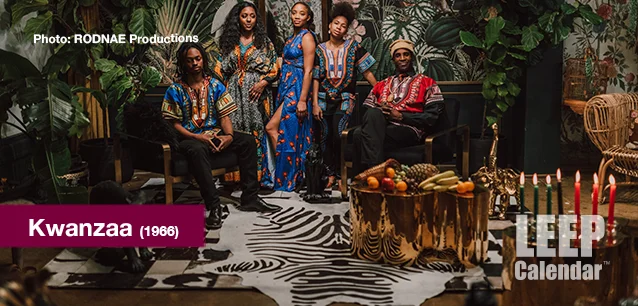 AD
AD
Today is: November 06
Scroll to explore events active on this date.
Additional Events on LEEP
LEEP INK FEATURES

August? Absolutely!
In August, we live through the Dog Days of Summer. It's hot and often humid, and those who can leave for better climates do. Down south, winter is in full force. August is also known as "the ...

In The Heat of July: July 2025 Events
Is it hot enough (or cold enough if you're below the equator) for you yet? There is actually a day for that! Like every month, I pick a diverse collection of events you may or may not know about. This ...

May Blooms: Events in May 2025
Along with October, May is one of the most densely packed months of the year. It's before the summer humidity and the last whole month of the school year. The weather is warming in t...
About the African Cultural Celebration of Kwanzaa
Ends: Jan 01, 2024
DESCRIPTION:
Kwanzaa, celebrated from December 26 to January 1, is a seven-day cultural festival to honor African heritage in African-American culture. Maulana Karenga, a professor and chairman of Black Studies at California State University, Long Beach, created Kwanzaa in 1966 as the first specifically African-American holiday following the Watts riots in Los Angeles, California, United States.
The name Kwanzaa comes from the phrase "matunda ya kwanza," which means "first fruits" in Swahili, a non-tribal African language spoken in much of the African continent.
The holiday is a time for reflection upon African American culture, community, and values guided by the Nguzo Saba, or seven principles.
The Seven Principles of Kwanzaa Are:
1. Unity (Umoja)
2. Self-determination (Kujichagulia)
3. Collective work and responsibility (Ujima)
4. Cooperative economics (Ujamaa)
5. Purpose (Nia)
6. Creativity (Kuumba)
7. Faith (Imani)
Each day of Kwanzaa emphasizes a different principle. Celebrants light a candle on the Kinara (candle holder), one for each day, and discuss the day's principle. The Kinara holds seven candles—three red on the left, three green on the right, and a black candle in the center.
Families gather during Kwanzaa to share feasts (Karamu), music, dance, poetry, narratives, and African drums. Traditional foods include dishes originating in various parts of Africa and commonly include ingredients like sesame seeds, peanuts (groundnuts), sweet potatoes, collard greens, and spicy sauces.
Gifts are exchanged primarily among children and are often educational or cultural items. The holiday culminates in a day of reflection where participants ask themselves and each other questions about their lives, their community, and their progression.
Over the years, Kwanzaa has spread in popularity in the United States and worldwide. The holiday fosters a sense of unity and pride among those of African descent. It is a secular holiday celebrated by people of any religious faith.
VIDEOS
Currently, this event does not have supporting videos.
SUPPORTING DOCUMENTS
Currently, this event does not have supporting documents.
ADDITIONAL IMAGES
Currently, this event does not have supporting images.
Where would you like to go now?
 AD
AD


/footer-logo.svg)
